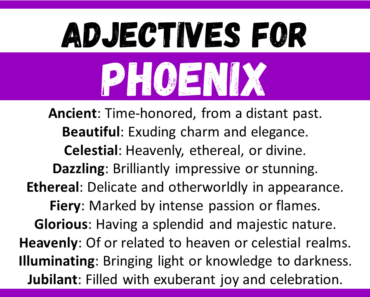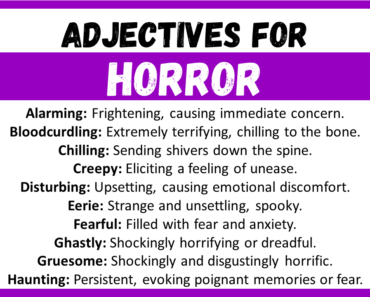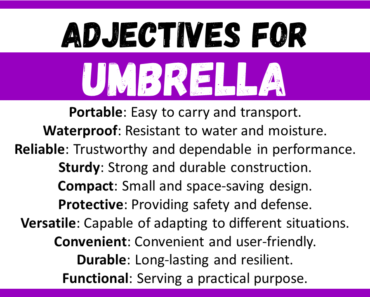Plastic, a versatile and widely used material, has become an integral part of our daily lives. Defined as a synthetic polymer made from petrochemicals, plastic’s exceptional properties make it an essential component in various industries. Understanding the vocabulary used to describe plastic is crucial, as it sheds light on its diverse characteristics, such as flexibility, durability, and lightweight nature. In this blog post, we will explore a comprehensive list of words that effectively capture the essence of this ubiquitous material, revealing its impact on modern society and the environment.
Adjectives for Plastic
Here are the 20 Most Popular adjectives for plastic:
- Biodegradable
- Brittle
- Durable
- Elastic
- Flexible
- Moldable
- Non-biodegradable
- Pliable
- Resilient
- Rigid
- Synthetic
- Transparent
- Tough
- Versatile
- Water-resistant
- Lightweight
- Impact-resistant
- Disposable
- Insulating
- Recyclable
Adjectives for “plastic pollution”:
- Widespread
- Alarming
- Detrimental
- Pervasive
- Disastrous
- Ubiquitous
- Harmful
- Persistent
- Uncontrolled
- Environmental
Adjectives for “plastic material”:
- Versatile
- Durable
- Lightweight
- Flexible
- Synthetic
- Resilient
- Moldable
- Non-biodegradable
- Transparent
- Waterproof
Adjectives for “plastic person”
- Superficial
- Pretentious
- Artificial
- Phony
- Deceptive
- False
- Masked
- Two-faced
Adjectives for “plastic surgery”:
- Cosmetic
- Reconstructive
- Enhancing
- Surgical
- Aesthetic
- Transformative
- Corrective
- Invasive
- Restorative
- Elective
Words to Describe Plastic with Meanings
- Biodegradable: Environmentally decomposes naturally over time.
- Brittle: Easily breaks or shatters.
- Durable: Long-lasting and resistant to wear.
- Elastic: Can stretch and return to shape.
- Flexible: Capable of bending without breaking.
- Moldable: Can be shaped or formed easily.
- Non-biodegradable: Does not naturally decompose in the environment.
- Pliable: Easily bendable or adaptable.
- Resilient: Bounces back after deformation.
- Rigid: Stiff and inflexible.
- Synthetic: Man-made, not occurring naturally.
- Transparent: See-through or clear.
- Tough: Strong and resistant to damage.
- Versatile: Adaptable and multi-functional.
- Water-resistant: Repels water to some extent.
- Lightweight: Low in weight.
- Impact-resistant: Withstands collisions or shocks.
- Disposable: Intended for single-use.
- Insulating: Prevents heat or electricity transfer.
- Recyclable: Can be processed for reuse.
Example Sentences for Plastic Adjectives
- The biodegradable bag decomposed quickly in nature.
- Be gentle; the toy is brittle and fragile.
- This durable phone withstands accidental drops.
- Rubber bands are elastic, stretching easily.
- The yoga mat is flexible for different poses.
- The artist created art using moldable clay.
- Avoid using non-biodegradable materials for the environment.
- The leather is pliable and easy to shape.
- The car’s tires are resilient against punctures.
- The table’s rigid structure ensures stability.
- The factory produces synthetic fabrics in bulk.
- The window is transparent, allowing clear views.
- The new suitcase is tough and sturdy.
- The Swiss Army knife is versatile, with multiple tools.
- The tent is water-resistant to protect from rain.
- The drone’s lightweight design ensures easy flying.
- The helmet’s impact-resistant material protects the head.
- Please use a disposable cup for the party.
- The insulating material kept the house warm.
- Remember to recycle recyclable plastics.
Explore More Words:
FAQ’s
How to describe plastic in writing?
Plastic can be described as a versatile and synthetic polymer material that is widely used in various industries due to its durability, flexibility, and lightweight nature.
What is another word for high-quality plastic?
Another word for high-quality plastic is “premium plastic,” which denotes plastic materials that are of superior or excellent quality.
Is plastic an adjective or adverb?
Plastic is primarily used as a noun to refer to the material itself. However, it can also function as an adjective when describing things related to or made of plastic, such as “plastic bottle” or “plastic toy.”








